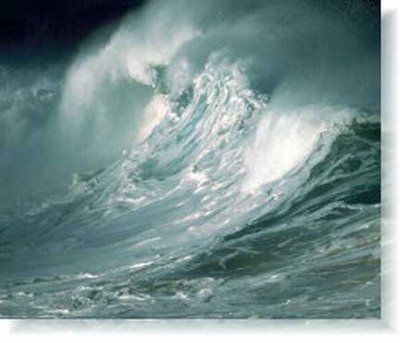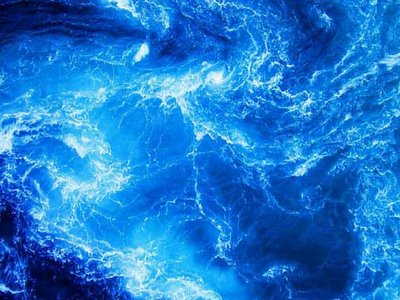Deep Rider

The magus is “a contemplator of heavenly and divine science, a studious observer and expositor of divine things.”
-- Marsilo Ficino
***
“(Isaac Newton) shared with his contemporaries a world-view that was not a weird coexistence of magic and science but an ediface in which all the bricks came from the same mold. Today we regard some of these as the foundation of science and are tempted to discard the others as useless relics of another age. But if they were not there, the building would have collapsed. ‘The Renaissance magus,’ says the historian Francis Yates, ‘is the immediate ancestor of the seventeenth-century scientist.’”
-- Phillip Ball, The Devil’s Doctor: Paracelsus and the World of Renaissance Magic and Science
***
I wonder, then, who today’s scientist anticipates, for science, for all of its magisterial wonders today, has half a brain, or lost touch with its occult source, both a sea and a madness. Perhaps the clues to who emerges lies in the following recap by Ball of the emergence of the scientist:
***
“Science did not emerge as a rational flight from medieval superstition; after all, the medieval scholastics were second to none in their pedantic rationality. What was needed for modern science to emerge was a renunciation of their bookish a priorism, with its Aristotelian notion that all things can be deduced by logical, abstract arguments from (ultimately arbitrary) first principles. Before the fertile logic of a genuinely scientific rationalism could assert itself, the sterile logic of Classical dogma had to give way to a form of empiricism that accepted the reality of certain unknowns and inexplicables such as the operation of occult forces. In this sense, men like Paracelsus and his fellow iconoclast Cornelius Agrippa were skeptics; they were prepared, indeed determined, to question what had gone before, to find things out for themselves rather than taking someone elses’s word for it.”

“... We must take into account the mystical solidarity between man and animal, which is a dominant characteristic of the religion of the paleo-hunters. By virtue of this, certain human beings are able to change into animals, or to understand their language, or to share in their prescience and occult powers. Each time a shaman succeeds in sharing the animal mode of being, he in a manner re-establishes the situation that existed in illo tempore, in mythical times, when the divorce between man and animal had not yet occurred.
“The tuletary animal of the Buryat shamans is called khubilgan, a term that can be interpreted as ‘metamorphosis,’ (from khubikhu, ‘to change oneself,’ ‘to take on another form’). In other words, the tuletary animal not only enables the shaman to transform himself; it is in a manner his ‘double,’ his alter ego. This alter ego is one of the shaman’s ‘souls,’ the ‘soul in animal form,’ or, more precisely, ‘life soul.’ Shamans challenge one another in animal form, and if his alter ego is killed in the fight, the shaman very soon dies himself.”
-- Mercea Eliade, Shamanism: Archaic Techniques of Ecstasy

“There is, then, no water that is wholly of the Pacific, or wholly of the Atlantic, or of the Indian or the Antarctic. The surf that we may find exhilarating at Virginia Beach or at La Jolla today may have lapped at the base of antarctic icebergs or sparkled in the Mediterranean sun, years ago, before it moved through dark and unseen waterways to the place we find it now. It is by the deep, hidden currents that the oceans are made one.”
-- Rachel Carson, The Sea Around Us
***
DEEP WAVE RIDER
Jan. 24, 2006
Deep waves stroll the oceans
unseen to all surfaces
on the cold wings of abyss,
a visceral tow glowing
with the gules of minerals
torn from the paps of hell.
He rides those waves too,
my fish-familiar, in this
songlike totem I ride here,
his salty ancient brogue
still rich on my tongue
after a thousand mortal
spans. I on a fish which
masts deep waves is
what makes the music
so hugely dark, opaque
and fell, a buckaroo’s derange
in Moby’s wake
where shattered hulks
and eerie churchbells
fan by too fast and dim
to hearken, much less name,
and life is pure Silurian,
a swarm of sharks and jellyfish
and trilobites about the
same matins now for a half
billion years. That infernal choir
lifts the base note I here sound,
my vox humana the highest
ache of jism and jawing
egg, the hot rush of futurity
which forever lives the
next day with ravenous teeth
in a gale of sweet-torn flesh.
Just what song is it, I
wonder, rolling three miles
beneath my saddle? What
beast of lyric hooves so wild
and regal blue as to make all
depths divine, be they in
my words or in the sea or in
the angel’s fall between
us who limns the barrows
of all lost gods. From trough
to crest I clasp my knees
to waves as tall as Pyranees
yet never crash on shores
my love will ever see,
as if love’s shout of pure
liquidity was never meant
for beds or beaches or
the dry breeches of songs
about love, rather than
the ones all depths love.
Primal as to drown
the dreams of shamans
etched on walls not seen
in ten thousand years,
this music is old, it was
lifted pure up to God
when men and beasts
were one, brother and
familiar, both in the
maw of appetite and
the stellar foam of lust,
both in the other so
vastly that whole
caverns failed to harrow
the rituals of rebirth
into the womb which
birthed us all.
Perhaps that’s why
I’m here on the biggest
waves no human eyes
can see, yeehawing
to high heaven on
thalassas of brine joy,
lurching and lifting
up to crown Manannan’s
thrall, wilding all the
way down here where
Uranos parked his balls
in a mess of Venusian
cream. When I’m on my
beast we lord the waves
which rock and roll the seas --
the boy astride his guitar
of a cock of fish of a pen,
come at last to gig
the big night music,
power--chording deep
waves like shouts of
whales between beneath
and past all shores.

THE HONOR AND GLORY OF WHALING
Herman Melville, Moby-Dick
Chapter lxxxii
There are some enterprises in which a careful disorderliness is the true method.
The more I dive into this matter of whaling, and push my researches up to the very spring-head of it, so much the more am I impressed with its great honorableness and antiquity; and especially when I find so many great demi-gods and heroes, prophets of all sorts, who one way or other have shed distinction upon it, I am transported with the reflection that I myself belong, though but subordinately, to so emblazoned a fraternity.
The gallant Perseus, a son of Jupiter, was the first whaleman; and to the eternal honor of our calling be it said, that the first whale attacked by our brotherhood was not killed with any sordid intent. Those were the knightly days of our profession, when we only bore arms to succor the distressed, and not to fill men's lamp-feeders. Every one knows the fine story of Perseus and Andromeda; how the lovely Andromeda, the daughter of a king, was tied to a rock on the sea-coast, and as Leviathan was in the very act of carrying her off, Perseus, the prince of whalemen, intrepidly advancing, harpooned the monster, and delivered and married the maid. It was an admirable artistic exploit, rarely achieved by the best harpooneers of the present day; inasmuch as this Leviathan was slain at the very first dart. And let no man doubt this Arkite story; for in the ancient Joppa, now Jaffa, on the Syrian coast, in one of the Pagan temples, there stood for many ages the vast skeleton of a whale, which the city's legends and all the inhabitants asserted to be the identical bones of the monster that Perseus slew. When the Romans took Joppa, the same skeleton was carried to Italy in triumph. What seems most singular and suggestively important in this story, is this: it was from Joppa that Jonah set sail.
Akin to the adventure of Perseus and Andromeda - indeed, by some supposed to be indirectly derived from it - is that famous story of St. George and the Dragon; which dragon I maintain to have been a whale; for in many old chronicles whales and dragons are strangely jumbled together, and often stand for each other. "Thou art as a lion of the waters, and as a dragon of the sea," saith Ezekiel; hereby, plainly meaning a whale; in truth, some versions of the Bible use that word itself. Besides, it would much subtract from the glory of the exploit had St. George but encountered a crawling reptile of the land, instead of doing battle with the great monster of the deep. Any man may kill a snake, but only a Perseus, a St. George, a Coffin, have the heart in them to march boldly up to a whale.
Let not the modern paintings of this scene mislead us; for though the creature encountered by that valiant whaleman of old is vaguely represented of a griffin- like shape, and though the battle is depicted on land and the saint on horseback, yet considering the great ignorance of those times, when the true form of the whale was unknown to artists; and considering that as in Perseus' case, St. George's whale might have crawled up out of the sea on the beach; and considering that the animal ridden by St. George might have been only a large seal, or sea-horse; bearing all this in mind, it will not appear altogether incompatible with the sacred legend and the ancientest draughts of the scene, to hold this so-called dragon no other than the great Leviathan himself. In fact, placed before the strict and piercing truth, this whole story will fare like that fish, flesh, and fowl idol of the Philistines, Dagon by name; who being planted before the ark of Israel, his horse's head and both the palms of his hands fell off from him, and only the stump or fishy part of him remained. Thus, then, one of our own noble stamp, even a whaleman, is the tutelary guardian of England; and by good rights, we harpooneers of Nantucket should be enrolled in the most noble order of St. George. And therefore, let not the knights of that honorable company (none of whom, I venture to say, have ever had to do with a whale like their great patron), let them never eye a Nantucketer with disdain, since even in our woollen frocks and tarred trowsers we are much better entitled to St. George's decoration than they.
Whether to admit Hercules among us or not, concerning this I long remained dubious: for though according to the Greek mythologies, that antique Crockett and Kit Carson - that brawny doer of rejoicing good deeds, was swallowed down and thrown up by a whale; still, whether that strictly makes a whaleman of him, that might be mooted. It nowhere appears that he ever actually harpooned his fish, unless, indeed, from the inside. Nevertheless, he may be deemed a sort of involuntary whaleman; at any rate the whale caught him, if he did not the whale. I claim him for one of our clan.
But, by the best contradictory authorities, this Grecian story of Hercules and the whale is considered to be derived from the still more ancient Hebrew story of Jonah and the whale; and vice versa; certainly they are very similar. If I claim the demigod then, why not the prophet?
Nor do heroes, saints, demigods, and prophets alone comprise the whole roll of our order. Our grand master is still to be named; for like royal kings of old times, we find the headwaters of our fraternity in nothing short of the great gods themselves. That wondrous oriental story is now to be rehearsed from the Shaster, which gives us the dread Vishnoo, one of the three persons in the godhead of the Hindoos; gives us this divine Vishnoo himself for our Lord; - Vishnoo, who, by the first of his ten earthly incarnations, has for ever set apart and sanctified the whale. When Brahma, or the God of Gods, saith the Shaster, resolved to recreate the world after one of its periodical dissolutions, he gave birth to Vishnoo, to preside over the work; but the Vedas, or mystical books, whose perusal would seem to have been indispensable to Vishnoo before beginning the creation, and which therefore must have contained something in the shape of practical hints to young architects, these Vedas were lying at the bottom of the waters; so Vishnoo became incarnate in a whale, and sounding down in him to the uttermost depths, rescued the sacred volumes. Was not this Vishnoo a whaleman, then? even as a man who rides a horse is called a horseman?
Perseus, St. George, Hercules, Jonah, and Vishnoo! there's a member-roll for you! What club but the whaleman's can head off like that?


<< Home